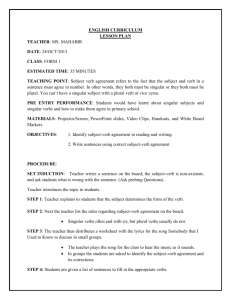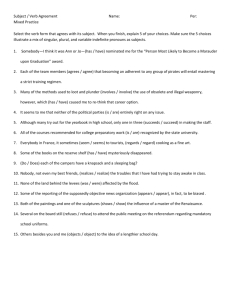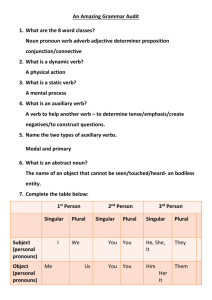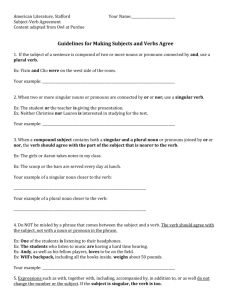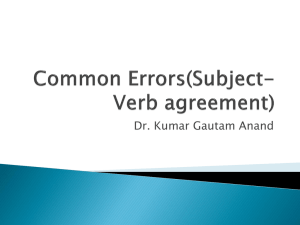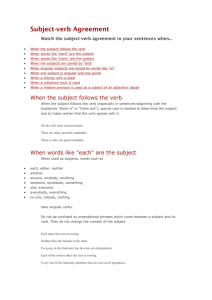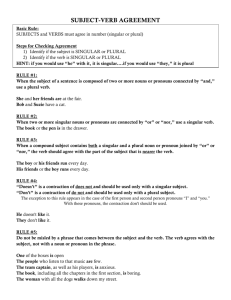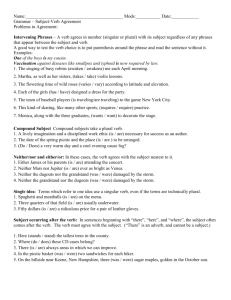Subject-Verb Agreement Work
advertisement
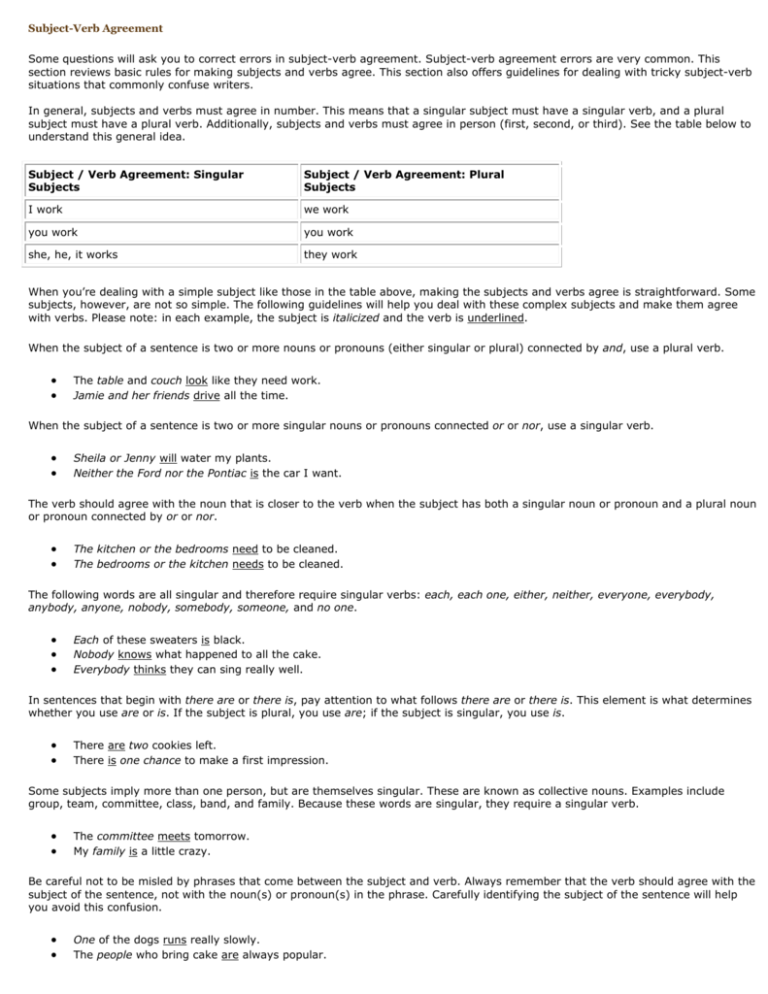
Subject-Verb Agreement Some questions will ask you to correct errors in subject-verb agreement. Subject-verb agreement errors are very common. This section reviews basic rules for making subjects and verbs agree. This section also offers guidelines for dealing with tricky subject-verb situations that commonly confuse writers. In general, subjects and verbs must agree in number. This means that a singular subject must have a singular verb, and a plural subject must have a plural verb. Additionally, subjects and verbs must agree in person (first, second, or third). See the table below to understand this general idea. Subject / Verb Agreement: Singular Subjects Subject / Verb Agreement: Plural Subjects I work we work you work you work she, he, it works they work When you’re dealing with a simple subject like those in the table above, making the subjects and verbs agree is straightforward. Some subjects, however, are not so simple. The following guidelines will help you deal with these complex subjects and make them agree with verbs. Please note: in each example, the subject is italicized and the verb is underlined. When the subject of a sentence is two or more nouns or pronouns (either singular or plural) connected by and, use a plural verb. The table and couch look like they need work. Jamie and her friends drive all the time. When the subject of a sentence is two or more singular nouns or pronouns connected or or nor, use a singular verb. Sheila or Jenny will water my plants. Neither the Ford nor the Pontiac is the car I want. The verb should agree with the noun that is closer to the verb when the subject has both a singular noun or pronoun and a plural noun or pronoun connected by or or nor. The kitchen or the bedrooms need to be cleaned. The bedrooms or the kitchen needs to be cleaned. The following words are all singular and therefore require singular verbs: each, each one, either, neither, everyone, everybody, anybody, anyone, nobody, somebody, someone, and no one. Each of these sweaters is black. Nobody knows what happened to all the cake. Everybody thinks they can sing really well. In sentences that begin with there are or there is, pay attention to what follows there are or there is. This element is what determines whether you use are or is. If the subject is plural, you use are; if the subject is singular, you use is. There are two cookies left. There is one chance to make a first impression. Some subjects imply more than one person, but are themselves singular. These are known as collective nouns. Examples include group, team, committee, class, band, and family. Because these words are singular, they require a singular verb. The committee meets tomorrow. My family is a little crazy. Be careful not to be misled by phrases that come between the subject and verb. Always remember that the verb should agree with the subject of the sentence, not with the noun(s) or pronoun(s) in the phrase. Carefully identifying the subject of the sentence will help you avoid this confusion. One of the dogs runs really slowly. The people who bring cake are always popular. Subject-Verb Agreement Exercise Choose the correct form of the verb that agrees with the subject. 1. Annie and her brothers (is, are) at school. 2. Either my mother or my father (is, are) coming to the meeting. 3. The dog or the cats (is, are) outside. 4. Either my shoes or your coat (is, are) always on the floor. 5. George and Tamara (doesn't, don't) want to see that movie. 6. Benito (doesn't, don't) know the answer. 7. One of my sisters (is, are) going on a trip to France. 8. The man with all the birds (live, lives) on my street. 9. The movie, including all the previews, (take, takes) about two hours to watch. 10. The players, as well as the captain, (want, wants) to win. 11. Either answer (is, are) acceptable. 12. Every one of those books (is, are) fiction. 13. Nobody (know, knows) the trouble I've seen. 14. (Is, Are) the news on at five or six? 15. Mathematics (is, are) John's favorite subject, while Civics (is, are) Andrea's favorite subject. 16. Eight dollars (is, are) the price of a movie these days. 17. (Is, Are) the tweezers in this drawer? 18. Your pants (is, are) at the cleaner's. 19. There (was, were) fifteen candies in that bag. Now there (is, are) only one left! 20. The committee (debates, debate) these questions carefully. 21. The committee (leads, lead) very different lives in private. 22. The prime minister, together with his wife, (greets, greet) the press cordially. 23. All of the CDs, even the scratched one, (is, are) in this case.

